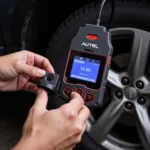Hybrid cars have become increasingly popular, but what does hybrid actually mean? Within the first few lines, you’ll understand the core concept: a hybrid vehicle combines a traditional gasoline engine with an electric motor and battery pack. This dual power source aims to improve fuel efficiency and reduce emissions, offering a bridge between conventional and fully electric vehicles. what does hybrid mean car
Understanding the Basics of Hybrid Cars
What makes a car a hybrid? At its heart, a hybrid car uses two distinct power sources: an internal combustion engine (ICE) and an electric motor powered by a battery. These two systems can work independently or together, depending on the driving situation. This flexibility is key to the hybrid’s improved fuel economy.
Different Types of Hybrid Systems
There are several types of hybrid systems, each with its own strengths and weaknesses. These include:
- Parallel Hybrids: In these systems, the engine and electric motor are connected directly to the transmission. Both can power the wheels individually or simultaneously. This is the most common type of hybrid system.
- Series Hybrids: Here, the engine acts as a generator, charging the battery that powers the electric motor. The electric motor is the sole power source for the wheels. This system offers superior efficiency in city driving.
- Plug-in Hybrids (PHEVs): PHEVs have larger batteries that can be charged from an external power source, allowing for all-electric driving for a limited range. They offer the benefits of both hybrid and electric vehicles.
How Does a Hybrid Car Work in Different Driving Situations?
Hybrid cars intelligently switch between the engine and motor, or use both, to optimize efficiency. Here are some examples:
- Starting and Low Speeds: The electric motor typically powers the car at low speeds, eliminating the need for the gas engine to idle, saving fuel.
- Acceleration: Both the engine and motor work together to provide maximum power and acceleration.
- Cruising: The engine typically powers the car at highway speeds, where it’s most efficient.
- Braking: Regenerative braking captures energy normally lost during braking and uses it to recharge the battery.
Benefits of Driving a Hybrid Car
Why choose a hybrid? There are several compelling reasons:
- Improved Fuel Economy: Hybrids significantly reduce fuel consumption, saving you money at the pump.
- Reduced Emissions: Lower fuel consumption translates to lower greenhouse gas emissions, making hybrids more environmentally friendly.
- Smooth and Quiet Operation: The electric motor provides a quiet and smooth driving experience, particularly at low speeds.
“Hybrids offer a compelling blend of efficiency and practicality,” says automotive expert, Dr. Emily Carter, “They are a significant step towards a more sustainable transportation future.”
What is the Difference Between Hybrid and Electric Cars?
While both aim for efficiency, hybrids and electric vehicles (EVs) have key differences:
- Power Source: Hybrids use both gas and electricity, while EVs rely solely on electricity.
- Range: Hybrids have unlimited range thanks to the gas engine, while EVs are limited by their battery capacity.
- Charging: Hybrids recharge their batteries through regenerative braking and the engine, while EVs require plugging into an external power source.
FAQs about Hybrid Cars
Here are some common questions about hybrid cars:
- Do hybrid cars need to be plugged in? Most hybrids do not need to be plugged in. PHEVs, however, can be plugged in to recharge their larger batteries.
- How long do hybrid batteries last? Hybrid batteries are designed to last for the lifespan of the car, typically 8-10 years or more.
- Are hybrid cars more expensive than gasoline cars? Hybrids generally have a higher initial cost, but the fuel savings can offset this difference over time.
Conclusion
What does hybrid mean in a car? It represents a smarter, more efficient, and environmentally conscious approach to driving. Combining the strengths of gasoline and electric power, hybrids offer a practical solution for today’s drivers. Considering a hybrid? Explore the different types and choose the one that best fits your needs.
Common questions include the difference between hybrid and electric vehicles, the longevity of hybrid batteries, and the cost comparison between hybrids and traditional gasoline cars. Other topics often explored include the environmental impact of hybrids, the different types of hybrid systems, and the future of hybrid technology.
For further assistance, contact us via WhatsApp: +1(641)206-8880, Email: cardiagtechworkshop@gmail.com or visit us at 276 Reock St, City of Orange, NJ 07050, United States. We have a 24/7 customer support team.


